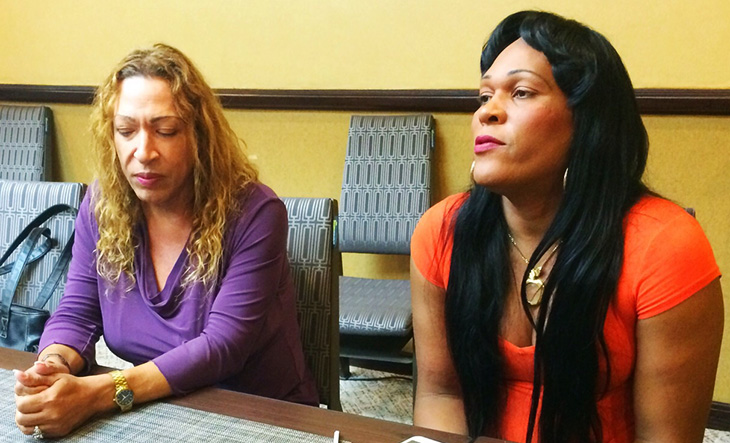The Health Policy Project ended in 2016. Work continued under Health Policy Plus (HP+) until 2022.
NEWS & VIEWS

Estefania Hernandez, left, and Nairobi Castillo participate in a USAID-funded workshop on better health care for transgender people in Santo Domingo, Dominican Republic. Photo by Cesar Castellanos, Health Policy Project.
Posted April 15, 2015
By Madison Mellish, Debbie McGill, and Marcio Maeda
This piece was originally posted on USAID's Impact Blog: http://www.usaid.gov/results-data/success-stories/dominican-republic-activists-work-heal-transgender-health-care.
Estefania Hernandez and Nairobi Castillo know to expect the worst when they visit a medical clinic. As members of the transgender community in Santo Domingo, Dominican Republic, they encounter health care providers who refer to them as “he”; who tell them to use the men’s bathroom; and who treat them with ridicule, scorn or even outright dismissal from the clinic.
This combination of stigma and ignorance in response to transgender people can have lethal consequences. Studies reported by USAID, for example, found that transgender women (born with male sex characteristics but identifying as female) are 49 times more likely than other adults to acquire HIV, and two to seven times more likely than men who have sex with men to acquire the virus. Moreover, between 45 percent and 65 percent of transgender women have HIV that has not been diagnosed. Among people with a positive diagnosis, transgender women are most likely to die from HIV-related causes.
Health care providers in Latin America and the Caribbean rarely receive training on sexual orientation and gender diversity in general or transgender health and sexuality in particular. As a result, they aren’t equipped to provide optimal clinical care or to recognize their own participation in stigma and discrimination.
To make health care settings more welcoming, accessible and ultimately effective for transgender people, USAID—through the Health Policy Project—began working in 2013 in Barbados, the Dominican Republic and Jamaica to design a training package for providers on the correct medical and social responses to this community. Hernandez, Castillo and other transgender activists have been part of the process from the start, meeting with clinicians and representatives of government and civil society organizations to explain who they are, what they need, and how to show these individuals the respect they deserve.
The new transgender health toolkit is scheduled to be ready for use in all three countries at the end of May. It teaches providers effective and client-friendly consultation skills, introduces them to medical problems common among transgender clients, and discusses the special care required by transgender clients who may choose gender reassignment.
To support the toolkit’s adoption, transgender people recently participated in a day-long workshop in each country to advocate for policy change to improve health. The goal of these workshops was to help transgender communities—in the words of Castillo—“become more visible, shed light on the problems they face and bring these challenges to the attention of decision-makers.”
These communities may already be stronger because of their participation in the project. According to Hernandez, the work on the toolkit “has presented a vision about how to support transgender women in the future—about making policies and decisions about them. It has made us see that, by getting involved, we can achieve much more.”
Through the work conducted by USAID and its partners in Latin America and the Caribbean, attitudes toward Hernandez, Castillo and other transgender women are evolving and stigma is being tackled. Addressing the human rights of these women and transgender people overall is essential to broader efforts to ensure high-quality health care for those living with HIV and those most at risk of infection.
The Health Policy Project, which runs from 2010 to 2015, is designed to help developing countries strengthen policy to improve family planning and reproductive health, HIV and maternal health services.
LINKS
What's New
- Something to Build On: “Innovation Exchange” Celebrates the Health Policy Project’s Close and a New Beginning
- What Will it Take for Tanzania to Achieve ART Targets and Ensure Long-Term Sustainability of the HIV Response?
- Helping Kenya’s County Leaders Advocate for Increased Health Investments
- HPP Holds Working Meeting on Ensuring Responsible PEPFAR Transitions for Key Populations
- Health Policy Project Celebrates 2016 International Women's Day
- HPP Staff Participate in White House Conference on HIV Stigma Reduction

